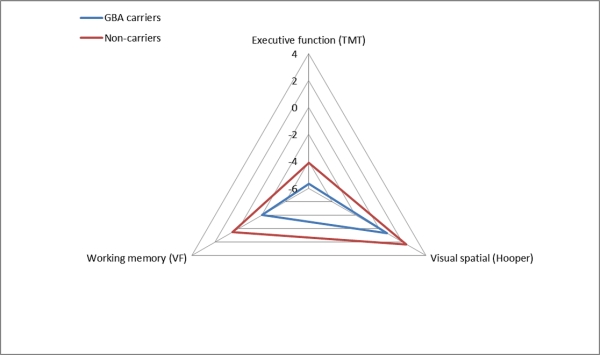Session Information
Date: Monday, June 20, 2016
Session Title: Parkinsonism, MSA, PSP
Session Time: 12:30pm-2:00pm
Objective: The objective of this study was to characterize, clinically and genetically, anAshkenazi Jewish cohort of patients diagnosed with DLB, looking for the association with GBA mutations and to explore the effects of these mutations on the clinical course of the disease.
Background: Mutations in the Glucocerebrosidase (GBA) gene are a risk factor for the development of Dementia with Lewy bodies (DLB). These mutations are common among Ashkenazi Jews (AJ) and appear to have an effect on the natural history of the disease.
Methods: 33 consecutively recruited, newly diagnosed AJ patients with clinically probable or possible DLB, underwent genotyping for the 8 known AJ GBA mutations as well as the LRRK2 G2019S mutation. Participants underwent detailed clinical and neuropsychological assessments which included standardized scales for autonomic dysfunction, REM sleep behavior disorder (RBD), depression, cognition (MoCA, TMT, FAS verbal fluency, digit span, Hooper Visual Organization Test) and motor parkinsonism (UPDRS III).
Results: 33% of the DLB patients were carriers of mutations in the GBA gene. Patients with DLB who carried GBA mutations (n=11) had a younger age of symptom onset (65.73±11.65 vs. 72.14±5.11; p=0.034), more frequent visual hallucinations (81.8% compared with 54.5% p=0.052) and higher scores on the RBD questionnaire (7.78±2.2 vs. 5.11±3.3; p=0.03). After adjusting for age and duration of symptoms, cognitive testing revealed that GBA mutation carriers had poorer cognition as assessed by the Montreal Cognitive assessment battery (MoCA) (18.75±5.99 vs. 23.23±3.16; p=0.034), lower scores on tests of verbal fluency (p=0.015), worse scores on tests of visuospatial function (p= 0.04)  and higher scores on the UPDRS motor assessment (GBA carriers: 36.72±10.62, non-carriers: 25.72±10.32; p=0.031).
and higher scores on the UPDRS motor assessment (GBA carriers: 36.72±10.62, non-carriers: 25.72±10.32; p=0.031).
Conclusions: One in three AJ patients diagnosed with DLB were carriers of a mutation in the GBA gene, making it the most common genetic mutation identified in association with this disease or with any dementing disorder. Mutations in the GBA gene were associated with more severe motor and cognitive dysfunction, supporting a specific contribution of the GBA gene or lysosome function to this clinical syndrome.
Previously presented at the Dementia with Lewy bodies conference in Fort Lauderdale, December 2015.
To cite this abstract in AMA style:
T. Shiner, A. Mirelman, M. Gana Weisz, A. Bar-Shira, E. Ash, R. Cialic, T. Gurevich, N. Bregman, A. Orr-Urtreger, N. Giladi. High frequency of mutations in the glucocerebrosidase (GBA) gene among Ashkenazi Jews with dementia with Lewy bodies [abstract]. Mov Disord. 2016; 31 (suppl 2). https://www.mdsabstracts.org/abstract/high-frequency-of-mutations-in-the-glucocerebrosidase-gba-gene-among-ashkenazi-jews-with-dementia-with-lewy-bodies/. Accessed October 22, 2025.« Back to 2016 International Congress
MDS Abstracts - https://www.mdsabstracts.org/abstract/high-frequency-of-mutations-in-the-glucocerebrosidase-gba-gene-among-ashkenazi-jews-with-dementia-with-lewy-bodies/
